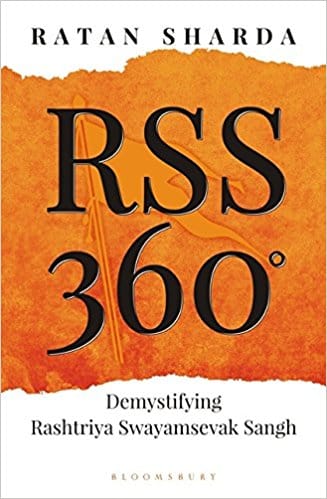
Author Ratan Sharda conveniently omits that the RSS was never at the forefront of the independence movement, and kowtowed to the British govt.
No cultural organisation in South Asia has been as influential, polarising and enigmatic as the Rashtriya Swayamsevak Sangh (RSS). As 2019 looms closer, the three letters are likely to dominate the national discourse once again.
It is this organisation, whose working is still a mystery for many, that Ratan Sharda attempts to demystify in RSS:360°. A former ‘pracharak’, Sharda first addresses the role of the RSS in the defence of democracy. He conveniently omits the fact that as an organisation, the RSS was never at the forefront of the independence movement and kowtowed to the British government.
Then he goes on to talk about its goals, philosophy and the injustices it faces (perceived or otherwise). The author deploys the usual nationalist polemic. He cites the lack of literature which has led to a biased media-based understanding of the RSS and its great cultural values.
The author is at his best when he exhibits his revisionist tendencies. He implies that K.B. Hedgewar (Doctorji) and M.S. Golwalkar (Guruji) were part of the freedom struggle and were in fact, great patriots. He carefully avoids Golwalkar’s gems such as Bunch of Thoughts and We or Our Nationhood Defined that reek of his, and the Sangh’s, anti-minority attitude and casteist mentality.
Sharda fails to confront the fact that RSS’s hateful rhetoric and problematic approach is the reason for alienating India’s diverse population.
The book, though neatly divided, is pretty puerile in prose quality and lacks style. What is most disconcerting is the lack of a bibliography in such a cumbersome task of defining and exhibiting an organisation which holds such sway.
The book talks a great deal about the need to consolidate the Hindus. It highlights the need to protect them from “mass-conversions” by Muslims and Christians who have foreign support.
Sharda doesn’t go to the trouble of substantiating such a grave accusation. The book also dedicates a space to how India has lost out on RSS’s school of cultural training and has neglected Indic languages and traditions. A noble sentiment, indeed, but backed by a political project of the Sangh is rendered hollow.
Sharda also spends time berating the secular-Marxist cabal in academia and social sciences which has kept out “true” understanding and dissemination of knowledge. Subramanian Swamy or Makarand Paranjape, however, were lone mavericks without institutions like Vivekananda International Centre to support and further the cause.
All in all the book showcases how RSS is still the ideological lynchpin of the BJP and will continue to dominate this narrative in 2019.
Arghya Sengupta works for Juggernaut Books. Views and opinions expressed are personal


Sorry, saw this only today. I have never claimed to be a former ‘prachaarak’ nor am I one. It shows the Arghya had made his mind even before reading the book and had no time for details.